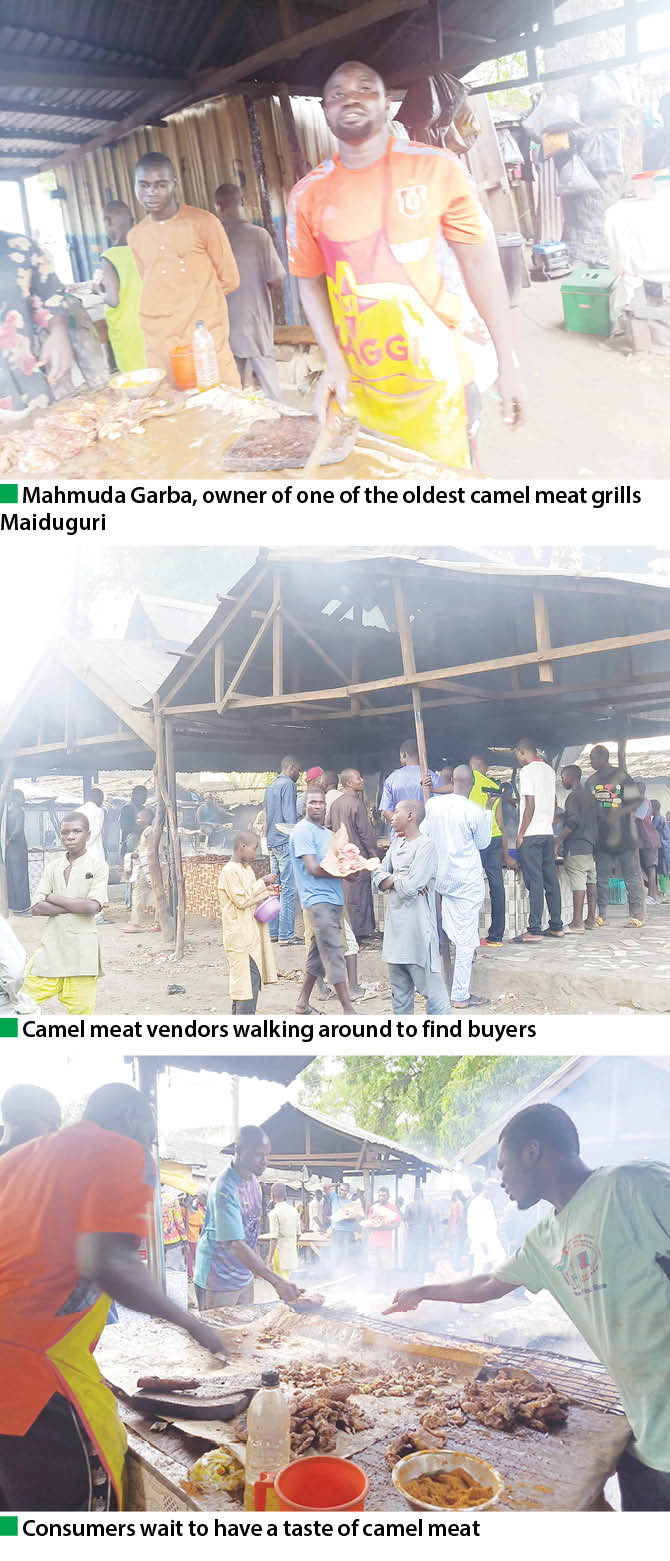Approaching the Maiduguri abattoir, one is greeted with the pungent smell of both raw and dry meat, and that of roasted cow skins (Pomo) and heads displayed everywhere on the market stalls.
The abattoir, the length and breadth of which requires at least 30 minutes to crisscross, is filled with the meat of different livestock – cow, goat, ram, but what stands out is the camel meat.
As you manoeuvre through the crowd, buyers and sellers are seen haggling over prices, while others respond to frequent calls by butchers seeking to lure passers-by to buy camel meat.
Malam Ali Buba, one of the butchers in Gambarou Market, said they slaughter over 20 camels and 100 cows every day at the abattoir.
“If not because of Boko Haram and the ECOWAS sanction that reduced the number of camels that come into the abattoir, we slaughter not less than 70 everyday but now, it’s only 20,” he said.
Mesmerising camel meat
On the other side of the abattoir, the complex preparation processes of camel meat by local grillers attract and keep all thoughts, sights, smell and taste senses active.
There, you will see tens of young men surrounding different grills, slicing, spicing and threading the camel meat onto skewers to grill before cutting them into smaller pieces to also fry.
At that point, customers – mostly young men and women, line up amidst the grilling smoke, grease, and small fire sparks, to buy a portion of the camel meat.
“The meat is cut to pieces to absorb juices of the sliced red onions and yaji (spice) made from a blend of kuli (groundnut cake), chiles, ground garlic, ginger, salt and other ingredients,” one of the meat sellers, Abba Yusuf, explained.
He said they got the knowledge and mastery of grilling the camel meat from Shuwa Arabs, who mostly prepare it for their family’s consumption.
“Today, the Shuwa Arabs are our major customers. They come from different parts of Maiduguri to buy grilled camel meat everyday from us.
“When we started, camel meat was so cheap that people mocked us whenever we were preparing to grill the meat, and very few non Shuwa Arabs patronized us.
“But now, the surge of people patronising us is unimaginable; the non Shuwa Arabs outnumber the original buyers, and that has equally made the camel meat expensive,” he said.
Mahmuda Garba, owner of one of the oldest camel meat grill at Gambarou Market, said he has spent over 20 years in the business and was attracted by its health benefit.
“One thing people don’t know about camels is that they live organically, so the meat is not contaminated with chemicals from injections and modern supplements. Camels only eat thorn trees, grasses, grains and do not have bile ducts.
“It only has a liver fluid that is highly sought after by people who want to treat eye disease. They say it’s very effective.
“Also, unlike beef, which makes people fat, you will maintain a moderate stomach and body size when you eat camel meat. I don’t eat any meat other than this, and so also my family. Alhamdullilah, we are very healthy,” he added.
Consumers trooping in
This reporter observed that a lot of consumers from all walks of life – irrespective of gender or status – have become regular callers to the camel meat joint.
Between 4 and 6pm, these consumers spend time at the joint eating the juicy meat. “And each day, for regular customers here, the satisfaction in the grilled camel meat is on the rise.”
The flavour of camel meat remains a subject of curiosity to many people, but for Hajara Bukar Liman, owner of Limanbe Vocational Centre, the unique taste was her attraction.
“I visit Gambarou to eat camel meat in the last seven years, but I don’t skip buying it whenever it rains. They said it’s healthier than beef and it’s medicinal,” she said.
She observed that every part of the camel has its unique taste. “The taste of the hump is different from the flesh, while the taste of the thigh and neck also differs.
“But generally, camel meat is somewhat gamey and slightly delicious with deep flavour,” she added.
Nafiu Shuaibu Hassan, one of the people that patronises the joint, said he travels a long distance to buy the camel meat.
“Our parents told us that unlike the cow meat which causes leg problems when a person ages, camel meat is medicinal and one can eat whatever quantity he needs without any problem.
“I now prefer to spend N1,200 on transport to come and eat the camel meat. You can see the quantity I’m eating now, and I have been eating this every other day, without purging or having stomach problems.
“My aged parents still eat camel meat in large quantities and none of them has been diagnosed with gout. But I assure you that it would have been a different story if they were eating beef,” he said.
You can’t escape camel meat in Maiduguri – Residents
Musa Bukar, a resident of Maiduguri metropolis, said as long as one resides in Maiduguri, he must have knowingly or unknowingly eaten camel meat either grilled from the roasted meat vendors, at home, in restaurants or in several other forms of commercial eateries.
“It is a lot cheaper than small ruminants that families are always tempted to settle for. Here in Maiduguri, dried mutton is sold at the abattoir, and much of it is camel meat,” Bukar disclosed, explaining that “most families settle for it more than they do raw meat because it is cheaper, and a little of it, when cooked, swells up to the satisfaction of the family.”
Camels are excellent source of nutrients – Dietician
According to experts, camels have a lifespan of 30 to 50 years, and have meat and milk that are excellent sources of nutrition.
Hajia Farida Hamisu, a dietician, said that camel meat is rich in vitamins, minerals, proteins and its dairy has more vitamin C than cow milk, “And, it’s low in fat and lactose.”
According to research, Hamisu said that camel meat is known for its potential health benefits, which includes weight loss due to its high protein and low fat, and eating the meat enhances athletic performance.
“So, for those wanting to taste the deliciousness of camel meat, I encourage them to eat because it’s adventurous enough for one to try.”
However, for centuries, eating camel meat has been a culture in many parts of the Middle East and North Africa, and it’s a common choice of Muslims because it’s permissible in Islam.
However, according to Islamic scholars, any Muslim that eats camel meat after ablution is recommended to do a fresh one because the pleasant taste on the palate invalidates that ablution.

 Join Daily Trust WhatsApp Community For Quick Access To News and Happenings Around You.
Join Daily Trust WhatsApp Community For Quick Access To News and Happenings Around You.

